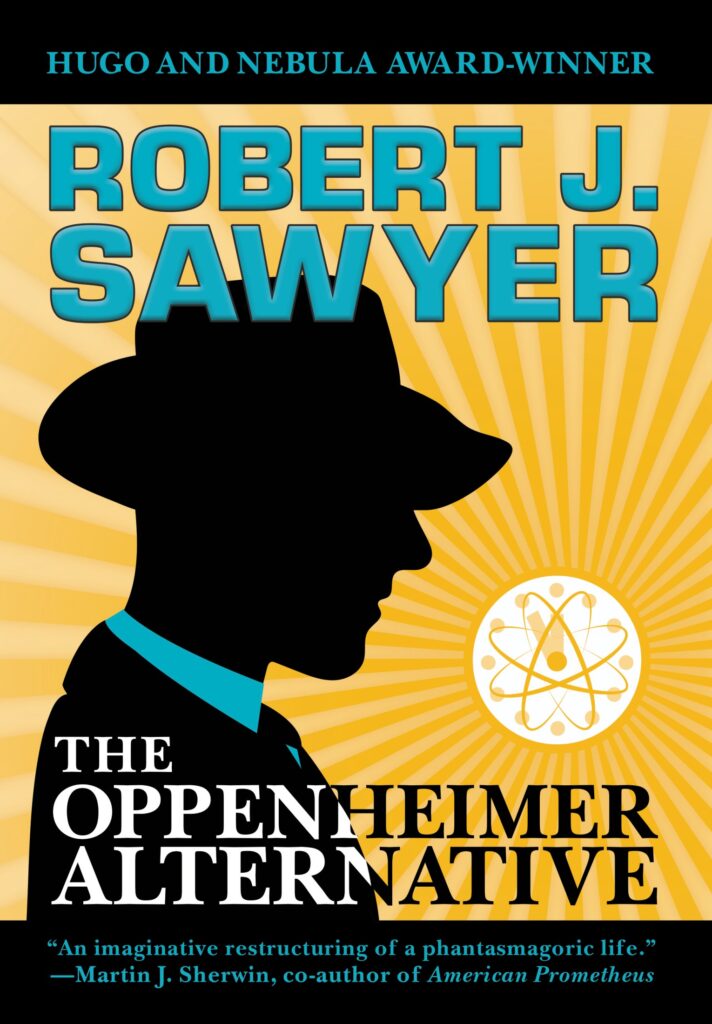Oppenheimer and the death of JFK
by Rob - November 22nd, 2023.Filed under: Uncategorized.

Sixty years ago today, on November 22, 1963, American president John F. Kennedy was assassinated — an event that had a big impact on J. Robert Oppenheimer, as portrayed in this scene from my novel The Oppenheimer Alternative:
From Dallas, Texas, the flash apparently official: President Kennedy died at 1:00 p.m. Central Standard Time — two o’clock Eastern Standard Time — some thirty-eight minutes ago.
—Walter Cronkite
Vindication at last! Oppie sat at his desk in Fuld Hall, drafting his acceptance speech. Teller might have extorted the Einstein Award, and, yes, it had been Teller himself who had also received this honor last year. But now, finally, it was Robert’s turn: next week, he’d receive the Enrico Fermi Award, named for the Italian navigator who had passed away nine years ago. That it came with a tax-free $50,000 check was nice. The news announced just this morning, that President Kennedy would personally present the award to him, was definitely sweet. And the gold medal with Fermi’s likeness, looking down and to the left with that slight, shy smile Oppie remembered so fondly, would certainly be a keepsake.
But what mattered most was the organization that was sponsoring the award. The A.E.C., the goddamned Atomic Energy Commission, the same body that had stripped Oppie of his security clearance nine years ago, had now done a complete one-eighty and was about to bestow its highest honor, its prize for lifetime achievement, on J. Robert Oppenheimer! He’d be back in the canon of nuclear giants along with the previous recipients: Fermi himself (the only posthumous laureate), then von Neumann, Lawrence, Wigner, Seaborg, Bethe, and, yes, Teller.
Glenn Seaborg, who had shared the Nobel Prize for the discovery of plutonium, was the current A.E.C. chair, and Oppie had no doubt that it was he, along with Oppie’s White House supporters including Dean Rusk, McGeorge Bundy, and Arthur Schlesinger, Jr., who had ensured Oppie would be this year’s recipient: a full, public, presidential acknowledgement that the commission had been wrong, wrong, so-fucking-wrong in stripping him of his Q clearance. Seaborg had told Oppie that, when he informed his predecessor, Lewis Strauss, about the upcoming award, Strauss had looked like Seaborg had punched him in the face.
Verna was out, and she’d left the inner door to Oppie’s office open, but Oppie heard a knock on the outer door and, without looking up from the blue-lined pad he was writing on, he called out, “Come in!”
“Dad …”
He saw his son Peter, now twenty-two, tall and lean, a look of pure shock on his face. Oppie pushed back his chair, got up, and strode into the secretarial office. “Is Kitty —“
Peter raised a hand. “She’s fine. Dad, I just heard it on my car radio. President Kennedy has been shot.”
Robert felt as if a bullet were tearing into his own flesh. He averted his gaze and took hold of the edge of Verna’s desk to steady himself. “I — I need a drink. Peter?”
“God, yes.”
He staggered into the walk-in closet where a few bottles were always kept, and —
A bullet. A single bullet. History didn’t turn on atom bombs; it pivoted on shots from guns, whether it was the assassination of Archduke Ferdinand beginning the First World War, or Hitler’s own bullet to the brain ending the Second in Europe, or, now, with the person who’d challenged the nation to put a man on the moon by the decade’s close, who’d stared down Khrushchev during the Cuban Missile Crisis when the world was truly at the brink of nuclear annihilation: shot, fate unknown. Alive; dead. Schrödinger’s cat, with the future hanging in the balance.
“Dad …?” said Peter. Oppie heard him but still just stood there, staring at the bottles arranged on the top of a small safe, glass rockets poised for launch.
“It’s okay, Dad,” said Peter again. “Never mind, then.” Oppie felt his son’s hand on his forearm leading him out of the closet into the room and helping him find a seat.
Verna came running in. “My God, did you hear?”
Oppie raised his head but he sounded far-off even to himself. “Peter says the president’s been shot.”
“Not just shot,” said Verna, her voice breaking. “They just announced it. He’s dead.”
Oppie sat for a moment listening to the barrage of his own pulse. “Well, then,” he said, his head swimming. “Well, then.” He was quiet for a time but at last rallied some strength. “Verna, can you knock on all the office doors? Tell everyone to go home, be with their families.”
She nodded and left.
“And, Peter, maybe … maybe you can drive me home?”
“Of course, Dad.”
But Oppie continued to just sit there, face propped up by his hands, bony elbows on the chair’s arms. “Now,” he said softly, “things are going to come apart very fast.

